
Organoids, Spheroids & Organs-on-Chips 2024
09:00
2024年11月18日
Slate Room

Steve Soper, Foundation Distinguished Professor; Director, Center of BioModular Multi-scale System for Precision Medicine, Adjunct Professor, Ulsan National Institute of Science & Technology, The University of Kansas
Pre-Conference Training Course from 09:00-11:00
Microfluidics and Nanofluidics for Diagnostic Tests
[Separate Registration Required to Attend this Pre-Conference Training Course]
11:00
2024年11月18日
Slate Room

Leanna Levine, Founder & CEO, ALine, Inc. United States of America
Pre-Conference Training Course from 11:00-13:00
Microfluidic Product Development
[Separate Registration Required to Attend this Pre-Conference Training Course]
This training course will explore the translation of science and nascent engineering programs into a well-structured product development program to address Reduction to Practice or proof of concept; Human factors engineering - what is it and why it matters; Design Control and Risk Control Roadmap for Development; Design for Manufacture and Assembly; Scale -up progression and manufacturing methods.
**A Must-Attend for Companies Embarking on Microfluidic Product Development**
13:00
2024年11月18日
Conference Entrance
Conference Registration, Materials Pick-Up and Networking in the Exhibit Hall
13:30
2024年11月18日
Plenary Ballroom
Session Title:
Lab-on-a-Chip and Microfluidics World Congress 2024
Opening Plenary Session
13:45
2024年11月18日
Plenary Ballroom
Welcome and Introduction to the Lab-on-a-Chip and Microfluidics World Congress 2024 by the Chairs: Professor Dino Di Carlo and Dr. Leanna Levine
2024 Conference Focus and Themes Highlighted Over the 3-Day Event
14:00
2024年11月18日
Plenary Ballroom
View Agenda of Conference Plenary Session on the Agenda Page of the Lab-on-a-Chip and Microfluidics 2024 Track
18:45
2024年11月18日
Exhibit Hall
Networking Reception in the Exhibit Hall with Beer, Wine and Dinner.
Network with Colleagues, Engage with the Exhibitors and View Posters.
20:15
2024年11月18日
Exhibit Hall
Close of Day 1 of the Conference
20:30
2024年11月18日
Slate Room

Noah Malmstadt, Professor of Chemical Engineering and Materials Science, University of Southern California, United States of America
3D-Printing of Microfluidics Training Course
[Separate Registration Required to Attend this Training Course]
07:30
2024年11月19日
Exhibit Hall
Morning Coffee, Continental Breakfast and Networking in the Exhibit Hall
08:58
2024年11月19日
Ballroom A
Session Title: Emerging Themes and Trends in Lab-on-a-Chip and Microfluidics 2024
09:00
2024年11月19日
Ballroom A
For Presentations from 09:00 - 10:30, please see Lab-on-a-Chip Track Agenda
10:55
2024年11月19日
Ballroom A
Presentations Focusing on Organoids in this Session
11:00
2024年11月19日
Ballroom A
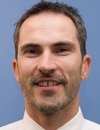
Holger Schmidt, Distinguished Professor of Electrical and Computer Engineering, Narinder Singh Kapany Chair of Optoelectronics, Director, W.M. Keck Center for Nanoscale Optofluidics, University of California-Santa Cruz, United States of America
Lab-on-Chip Devices For Analysis of Extracellular Vesicles and Their Contents From Cerebral Organoid Tissue
Cultured organoids have emerged as important test beds for studying cell development and disease. Sub-micron sized extracellular vesicles (EVs), including exosomes, secreted by these organoids provide an ideal opportunity for assessing and continuously monitoring organoid status on the molecular level. I will describe the development of integrated lab-on-chip devices for real-time analysis of EVs produced in a custom 3D cerebral organoid tissue culture platform. This includes the detection of individual exosomes as well as their molecular biomarker cargo using single particle fluorescence and trapping-assisted nanopore sensing. I will also discuss the direct incorporation of this electro-optofluidic lab-on-chip within the tissue culture platform.
11:30
2024年11月19日
Ballroom A
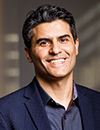
Mehdi Nikkhah, Associate Professor of Bioengineering, Arizona State University, United States of America
Integrating Tissue-on-a-Chip Systems with Single-Cell Analysis to Study Disease Progression and Test Therapeutics
Ex vivo three-dimensional (3D) organotypic tissue-on-a-chip models have become essential tools in biomedical and preclinical research. These technologies provide a deeper understanding of complex human diseases, effectively addressing the limitations of traditional animal models. Tissue-on-a-chip systems have also significantly accelerated drug development by creating scalable, high-throughput platforms for efficiently evaluating the effectiveness of various drugs and compounds. In this seminar, Dr. Nikkhah will present his lab's multidisciplinary research, which integrates microfluidic technologies, advanced biomaterials, and single-cell analysis to engineer the next generation of physiologically relevant tissue-on-a-chip platforms for disease modeling and drug testing. The seminar will particularly emphasize their innovative work in designing complex diseased landscapes, such as the tumor microenvironment (TME), to study the early stages of cancer progression, particularly during invasion and metastasis. Additionally, this seminar will also discuss how disease-on-a-chip systems facilitate novel target and drug discoveries for advanced therapeutics.
12:00
2024年11月19日
Ballroom A
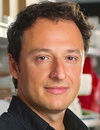
Alysson Muotri, Professor, Director of the Stem Cell Program, University of California-San Diego, United States of America
Applications of Human Brain Organogenesis
Structural and transcriptional changes during early brain maturation follow fixed developmental programs defined by genetics. However, whether this is true for functional network activity remains unknown, primarily due to experimental inaccessibility of the initial stages of the living human brain. We developed cortical organoids that spontaneously display periodic and regular oscillatory network events that are dependent on glutamatergic and GABAergic signaling. These nested oscillations exhibit cross-frequency coupling, proposed to coordinate neuronal computation and communication. As evidence of potential network maturation, oscillatory activity subsequently transitioned to more spatiotemporally irregular patterns, capturing features observed in preterm human electroencephalography (EEG). These results show that the development of structured network activity in the human neocortex may follow stable genetic programming, even in the absence of external or subcortical inputs. Our approach provides novel opportunities for investigating and manipulating the role of network activity in the developing human cortex. Applications for neurodevelopmental disorders, brain evolution and space exploration will be discussed.
12:30
2024年11月19日
Exhibit Hall
Networking Buffet Luncheon -- Network with Exhibitors and Colleagues, View Posters
13:20
2024年11月19日
Ballroom A
Session Title: Organoids and Organs-on-chips -- Utilizing Microfluidics for Harvesting Biological Insights
13:30
2024年11月19日
Ballroom A
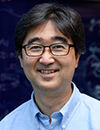
Shuichi Takayama, Professor, Georgia Research Alliance Eminent Scholar, Georgia Institute of Technology, United States of America
Organoids with Reversed Biopolarity (ORBs): SARS-CoV-2 Drug Testing and Breast Cancer Progression
This presentation will describe production of sub-millimeter diameter, consistent size and shape, lung, kidney, and mammary organoids that have an inverted, apical-out geometry. These Organoids with Reversed Biopolarity (ORBs) are used in 384 well plates in a single-organoid-per-well format to test drugs and disease physiology. The airway ORBs are infected with high yields with multiple SARS-CoV-2 strains with Omicron variant showing highest viral replication and Delta giving the most inflammatory response. The ORBs also predict anti-viral drug efficacy correctly where conventional 2D cultures give false signals. Early-stage breast cancer progression model studies will also be discussed.
14:00
2024年11月19日
Ballroom A
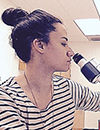
Alice Soragni, Assistant Professor, University of California-Los Angeles, United States of America
Leveraging Patient-derived Tumor Organoids For Precision Medicine
Patient-derived tumor organoids (PDTOs) are representative of the histopathology and physiological behavior of tumors. They are clinically relevant, tractable ex vivo models that can be quickly established from tumor biopsies and surgical samples. There is increasing interest in leveraging tumor organoids for drug development and personalized medicine applications for their ability to maintain principal features of the tumor they originate from, including drug response. PDTOs are particularly important to model rare tumors which often completely lack experimental models. We routinely establish organoids from a spectrum of tumors, including rare ovarian and peritoneal cancers (Phan et al, Communications Biology, 2019), benign tumors such as cutaneous neurofibromas (Nguyen et al, Cell Reports Methods, 2024), indolent bone cancers (Al Shihabi et al, Science Advances, 2022) and aggressive sarcomas (Al Shihabi et al, in press, 2024). We have developed a unique organoid screening platform that uses a modified geometry to seed or bioprint cells in a robust, high throughput and automation-compatible format that bypasses the need for any cell sorting, passaging or in vitro expansion. Our short screening timeline, with results available within one week from surgery, is compatible with therapeutic decision making. Overall, we have been able to identify unique drug responses to both fast and slow-growing cancers, including for tumors that are recalcitrant or impossible to grow as patient-derived xenografts. In a pilot study of PDTOs established from over 120 sarcomas, a family of rare tumors arising from bone or soft tissue, we demonstrated how PDTO drug screening provides sensitivity information that correlates with clinical features yielding actionable information for treatment guidance (Al Shihabi et al, in press, 2024). Importantly, sarcoma organoid responses complemented genetic sequencing and mirrored patient outcomes, leading to the launch of a clinical trial to test PDTO use in osteosarcoma (An Organoid-based Functional Precision Medicine Trial in Osteosarcoma: PREMOST, NCT06064682).
14:30
2024年11月19日
Ballroom A

Mandy Esch, Project Leader, National Institute of Standards and Technology (NIST), United States of America
Development of Pumpless Single-Organ and Multi-Organ MPS
Single and multi-organ microphysiologic systems (MPS) can be used to detect secondary drug toxicities stemming from drug metabolites. Here we describe how to design and prototype such systems to replicate key aspects of the human body that influence the concentration of drug metabolites within the system. Using 3D printing we have prototyped and tested several microfluidic MPS that operate with liver and heart tissues and that can recirculate near-physiological amounts of cell culture medium. We have also developed several devices that recirculate small amounts of cell culture medium in a way that makes it feasible to culture mechano-sensitive cells such as HUVEC or GI tract epithelial cells within the system. The talk given here is a summary of our efforts in this area.
15:00
2024年11月19日
Exhibit Hall
Mid-Afternoon Coffee Break and Networking in the Exhibit Hall
15:25
2024年11月19日
Ballroom A
Please view Agenda for the Second Half of the Afternoon in the Lab-on-a-Chip Track Agenda
18:30
2024年11月19日
Exhibit Hall
Networking Reception with Beer, Wine and Dinner in the Exhibit Hall -- Network with Exhibitors, Colleagues and View Posters
20:15
2024年11月19日
Exhibit Hall
Close of Day 2 Main Conference Programming
20:30
2024年11月19日
Slate Room

Shuichi Takayama, Professor, Georgia Research Alliance Eminent Scholar, and Price Gilbert, Jr. Chair in Regenerative Engineering and Medicine, Georgia Institute of Technology & Emory University School of Medicine, United States of America
Introduction to Microfluidics Training Course
[Separate Registration Required to Attend this Training Course]
07:30
2024年11月20日
Exhibit Hall
Morning Coffee, Continental Breakfast and Networking in the Exhibit Hall
08:00
2024年11月20日
Industry Breakout Round Tables: Each Round-Table Moderated by an Industry Participant -- Delegates Engage with Moderator and Each Other to Discuss Commercialization Themes
Moderators are:
David Weitz, Harvard - Microfluidics
Roger Kamm, MIT - Organs-on-Chips
Greg Cooksey, NIST - Flow Cytometry
09:00
2024年11月20日
Ballroom B
Session Title: Continuing Coverage of Organoids
09:30
2024年11月20日
Ballroom B
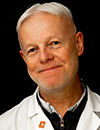
Robert Halliwell, Professor of Neuroscience, University of The Pacific, United States of America
Neurons from Human Stem Cells in 2D and 3D Culture for the Discovery of New Antiseizure Agents
Somatic tissues derived from human stem cells offer significant advantages over animal models for drug studies and disease modeling. For over 20 years, my lab has been addressing the neuropharmacological and neurophysiological properties of human stem cell derived neurons in 2D and, more recently, in 3D culture. This presentation will cover the challenges and advantages in combining stem cell created neuroglial cells, maintained in ultra-long-term culture, with multi-electrode array technology, to advance the discovery of novel antiseizure agents for epilepsy. Specifically, I will present recent data demonstrating that human neuroglia cell networks are able to detect the antiseizure properties of diverse antiepileptic drugs with high sensitivity, specificity and reliability. I will also present one of our recent studies showing that fenamates, a well-established class of NSAID, that are also subunit-selective potentiators of the GABAA receptor (the major inhibitory receptor in the brain) have potent antiseizure properties. These observations provide new evidence for a novel therapeutic approach to the treatment of epilepsy, and we are exploring these well-established NSAIDs for drug repurposing. Overall, our data, and that emerging from other labs, demonstrate the power of stem cell derived neural circuits, supported by glia to identify new and novel agents for complex, difficult-to-treat, neuropsychiatric disorders.
10:00
2024年11月20日
Ballroom B
For Remaining Talks in this Session, Please see Details Under Flow Cytometry and EVs Agenda
13:00
2024年11月20日
Exhibit Hall
Networking Buffet Luncheon in the Exhibit Hall -- Network with Exhibitors, Colleagues and View Posters
15:00
2024年11月20日
Ballroom A
Poster Awards
3 Cash Awards Sponsored by the RSC and Lab-on-a-Chip Journal + Raffle for iPad Drawing
* 活动内容有可能不事先告知作更动及调整。
